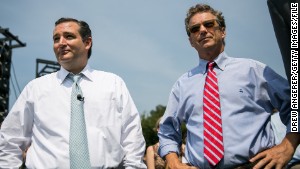Editor's note: Julian Zelizer is a professor of history and public affairs at Princeton University. He is the author of "Jimmy Carter" and "Governing America."
(CNN) -- A fight has broken out between two of the most prominent members of the Republican Party: Texas Sen. Ted Cruz and Kentucky Sen. Rand Paul.
In an op-ed for Breitbart News, Paul took a shot at Cruz, without actually naming him, when he wrote, "I will remind anyone who thinks we will win elections by trashing previous Republican nominees or holding oneself out as some paragon in the mold of Reagan, that splintering the party is not the route to victory." This was just one more flash point in the ongoing tension that has characterized their relationship.
The back-and-forth has captured considerable attention since both men have been discussed as possible contenders for the Republican nomination in 2016.
 Julian Zelizer
Julian Zelizer Each is seen as representing a different faction of the Republican right: Cruz the take-no-prisoners, slash-and-burn conservatives who will do just about anything to obtain their objectives and Paul the libertarian voice pushing back against all forms of government.
If Cruz and Paul turn out to be the major spokespersons for the debate about where the Republican Party should go, then the party is going to be in some big trouble.
Cruz represents an extremist wing of the GOP that can't seem to govern. Since the emergence of the tea party in 2009, the Republican Party has been shaped by a group of politicians who have been willing to employ extraordinarily aggressive tactics in the pursuit of cuts to domestic spending. Nobody has symbolized this style of leadership more than Cruz. He led the drumbeat to shut down the federal government to force President Obama's hand on spending and has favored the Republican refusal to raise the debt ceiling. Cruz has also been a master of the filibuster, employing variations of the tactic to bring the Senate to a standstill.
This image of obstructionist governance might excite the most loyal activists in the party, but it is not a style conducive to presidential leadership and it is not a style that plays well at a national level.
 Senators Ted Cruz, left, of Texas, and Rand Paul of Kentucky.
Senators Ted Cruz, left, of Texas, and Rand Paul of Kentucky. Republicans have suffered greatly in the polls as a result of these kinds of extremist tactics. One recent poll found that four out of five Americans don't trust the Republican Party. "That's just about as bad as it gets," noted MSNBC host, and Republican, Joe Scarborough. Many Americans question whether the Republicans can govern. A Cruz candidacy would perfectly set up a Hillary Clinton candidacy by allowing Democrats to emphasize her ability to get things done and make the political system work.
Rand Paul represents a different problem: He is a politician whose rhetoric is totally at odds with the history of the GOP. Since the 1930s, libertarians have had trouble gaining traction within the party.
The reality has been that most Republicans have embraced the federal government as a permanent part of national politics. In the area of national security, the party has been a driving force behind the expansion of the military establishment since the Cold War.
While some Republicans like Paul might now rail against the surveillance tactics of the National Security Agency, the recent power of this agency was built on the foundation that Republicans built with the war on terrorism under President George W. Bush.
Neither have Republicans been a true small government party in domestic policy. Studies have shown how federal spending has grown more dramatically under Republican presidents, including Ronald Reagan, than Democrats.
Most Republicans have avoided cutting most of the big-ticket programs, such as Social Security or farm assistance, while pushing for an expansion of government in other areas, such as Medicare Prescription Drugs. Republican legislators have been as skillful at pork-barrel politics as anyone from the other side of the aisle.
Though Paul may claim he will do things differently, Democrats could have a field day challenging the veracity of such claims given the weight of history that he faces.
The weaknesses of both men—Cruz in terms of his style and Paul in terms of his rhetoric—point out how desperate the GOP is to find someone who can build a broad coalition, something that is essential for a presidential victory, particularly when Republicans will likely be facing a formidable candidate.
The problems of New Jersey Gov. Chris Christie have been a huge blow to the party, and there are not many alternatives at this point who are willing to run to replace a figure who, in terms of style of governance and rhetoric, would have a better chance of appealing to voters beyond the base. This is the reason former Florida Gov. Jeb Bush is getting so much buzz, as potentially the only other person who can fill this void.
If Republicans can't find some alternative and the primaries revolve around the tension between Ted Cruz and Rand Paul, Democrats will be in excellent position to retain the White House in 2016.
Follow us on Twitter @CNNOpinion.
Join us on Facebook/CNNOpinion.
{ 0 comments... read them below or add one }
Post a Comment